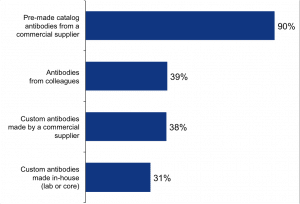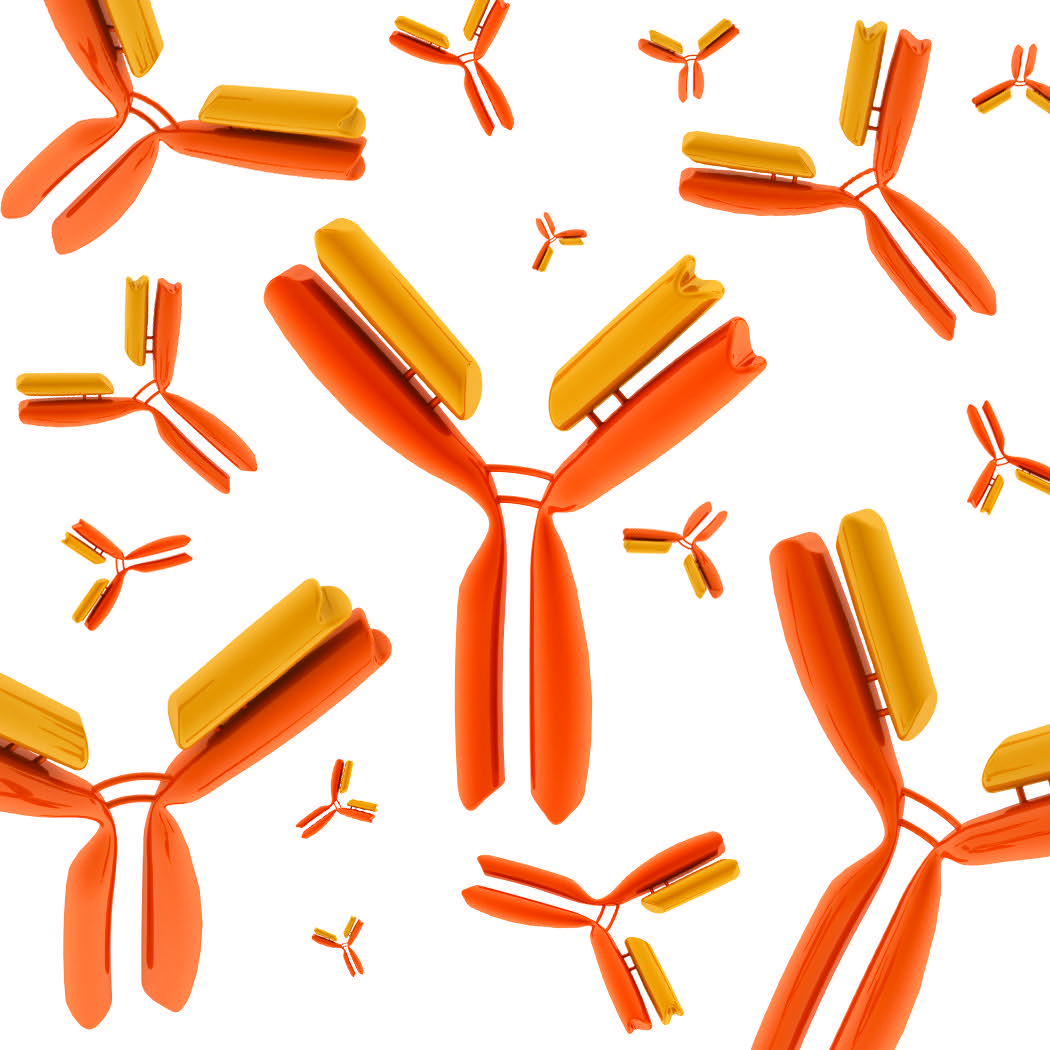The 2017 Market for Research Antibodies
The 2017 Market for Research Antibodies: Keys to Success for Commercial Suppliers is BioInformatics LLC’s newest report, a comprehensive analysis of this lucrative market. Designed specifically for suppliers of commercial, pre-made catalog antibodies, this primary research report identifies scientists’ expectations and preferences with regards to usage, brands, purchasing, product quality and budgets. For companies competing in the antibodies market and for those about to enter, key findings highlight market share, competitive positioning, customer satisfaction and how well current products meet researchers’ needs. Additionally, the report identifies “best in class” vendors by application and by the most widely-used techniques, all of which identify gaps that present opportunities for antibodies suppliers.
Research antibodies are commonly used in basic and clinical research because they react to the presence of specific proteins. They are commercially available from hundreds of companies and in most cases, can be used without intellectual property limitations. Of scientists who use antibodies, the majority use commercial, pre-made antibodies. In addition to pre-made antibodies, however, scientists still rely on custom antibodies (either from a commercial supplier or made in-house) and antibodies from their colleagues for less common or newly identified gene targets. It is common practice to share published reagents, which are not commercially available—and colleagues are likely sharing their own custom antibodies.

The antibody market is characterized by several large players including Abcam, Cell Signaling Technology, MilliporeSigma, Santa Cruz Biotechnology and Thermo Fisher Scientific. However, the market is extremely fragmented, with the largest suppliers controlling relatively small shares of the total market. This fragmentation is an ideal situation for scientists as they are able to choose the particular brand of antibody that is optimized for their particular application. While this fragmentation can be frustrating for suppliers, it may also present opportunities for growth.
Strategies for success in this market seem to be focused around two different market strategies. Abcam has grown rapidly to become the market share leader by focusing on catalog breadth and convenience. Cell Signaling Technology has grown by focusing on providing quality antibodies for a particular area of research (cell signaling) and by developing other technologies to address the same field. Thus, the two growth strategies currently observed in the market include growth by catalog expansion, or growth by application expertise. These two models have different benefits.
There is a strong correlation between a customer’s likelihood to repurchase from a particular supplier and their likelihood to recommend that supplier to a colleague. In addition, recommendations from colleagues are frequently cited as the preferred way among scientific consumers to learn about new products and services for their work a fact complicated by the proliferation of antibody review websites. Therefore, it is critical that suppliers looking to grow share in this market focus on maintaining satisfaction among their current customer base. With growing attention being paid to the validation of antibodies the bar for maintaining satisfaction may soon be set even higher.
The availability of antibody validation documentation is the most important consideration in the pre-purchase decision for 49% of respondents. When we asked “What is needed for validation to become a routine and affordable practice for all researchers using antibodies?” and got hundreds of responses. One scientist wrote:
“A western blot is not enough, the band from the western must be cut out and sequenced by mass spec to confirm protein specificity. We have done a few and are at about 50% of the Ab not detecting what the vendor says!”
Another scientist commented:
“Commercial antibodies should be validated AS A STANDARD by the producer for every application they are sold for. But even though they are claim to be, I still encounter lack of specificity.”
Still another observed:
“Cross-reactivity is one of the key problems we have in my lab. We buy Abs specified as non-reactive with other species but that’s not the case. We work with different cell lines and primary cultures and I think the Ab companies have to up their game!!!!”
And finally, this researcher wrote:
“Specificity is critical. Working with GPCR antibodies, the vast majority are ‘crap’. Specificity using protein knockdown with si/shRNAs and/or absence of labeling in knockout animals is critical. I can see that this would be expensive for companies to do, but it is expensive and a waste of time researchers trying different antibodies that do not work against their desired targets.”
The 2017 Market for Research Antibodies: Keys to Success for Commercial Suppliers is a valuable resource for understanding the various criteria laboratories use to choose their antibodies suppliers and the critical touchpoints in the purchasing process where suppliers can influence this decision. More specifically, how antibodies are ordered is documented, with an emphasis on typical size of purchases, average spend, projected spend, preferred ordering channels and likelihood to repurchase.
For suppliers that are seeking ways to differentiate their products in this competitive market, you can download an executive summary and table of content here: The 2017 Market for Research Antibodies: Keys to Success for Commercial Suppliers. The report highlights what more than 1,000 scientists from laboratories around the world indicate would help them achieve their research objectives. At strategic and tactical levels, suppliers can use this report with confidence to make decisions about developing and marketing commercial, pre-made catalog antibodies.





